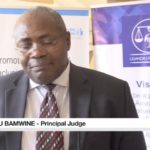The African Academy of Sciences (AAS) is piloting seed funding for early-career researchers of up to £600,000 (US$760,500) – supported by the Wellcome Trust and the UK’s Department for International Development (DFID), which urges researchers and health innovators to use “people-centred” approaches in their research work.
According to Ms Lillian Mutengu, AAS’s public and community engagement manager, the implementers of research want societies and communities in Africa to appreciate the value of science and research.
“We want society to value science and research and its role in improving health and transforming lives,” said Mutengu, adding that, “We can only achieve these outcomes if we, through mutually beneficial conversations, seek perspectives from communities and wider publics where research and science gains its relevance.”
Ms Mutengu said many researchers have engaged and consulted with communities to improve recruitment and retention into research studies and in order to disseminate research results. However, she added the AAS wants to expand this practice to ensure that researchers encourage and engage research communities and wider lay publics, purposely seeking their experiences and perspectives about research and science, and using them to enrich research questions, design and outcomes.
“When people know their perspectives and concerns are being considered and respected by researchers, they begin to build trust in researchers and the research which translates into utilisation of research outcomes,” she said.
Now a new funding model, according to organisers, will prioritise community and public engagement and make it almost mandatory for higher education and other researchers on the African continent to consult the public before they get grants from the AAS.
The announcement was recently made at a meeting of Training Health Researchers into Vocational Excellence (THRiVE) held in Kampala. The AAS funds researchers at more than 50 lead and partner institutions of higher learning across the African continent to do cutting-edge research. It is now pushing the community and public engagement agenda in a deliberate move to improve application of research findings on the continent.
Ms Mutengu urged researchers on the African continent to consult with the public at the very initial stages when they are conceptualising their (research) ideas because then the research is likely to be more relevant and its findings adopted by the communities.”
“Our priority is research that has potential to positively impact society and research findings that can be consumed,” she said.
The new model will override the old where higher education and PhD researchers focused on media and policy engagement, not necessarily paying much attention to communities and the public.
Nelson Sewankambo, a researcher and professor of medicine at Makerere University Medical School of Public Health, welcomed the move by the AAS, saying that there had been a gap between researchers and communities on the continent.
“We have had this disconnect for so long,” said Sewankambo, adding that to get the impact they want, researchers needed to engage policy makers early when formulating research ideas.
The professor said the use of research findings on the African continent was low despite significant amounts of research taking place. He hoped the new funding model would help reverse the trend and make communities feel part of and appreciate research.
The issue was highlighted at the THRiVE meeting attended by African health researchers and innovators, centred on “building scientists for the future”, but extended to the urgent need for the researchers to engage communities if they are to generate “impact” research.
Outlining the benefits of engaging communities during THRiVE meeting in Kampala, Dr Annettee Nakimuli, lecturer in the Department of Obstetrics and Gynaecology at the College of Health Sciences at Makerere University, said: “They [communities] are more likely to welcome research findings and to adopt them when they are consulted and made to feel they are part of the process.”
Abraham Mamela from the University of Botswana, and founder of knowledge management company the Infers Group, vouched for the need for community engagement in research and said the directorate of research in the Southern African country required researchers to seek local chiefs’ consent when they moved into communities to draw research samples.








